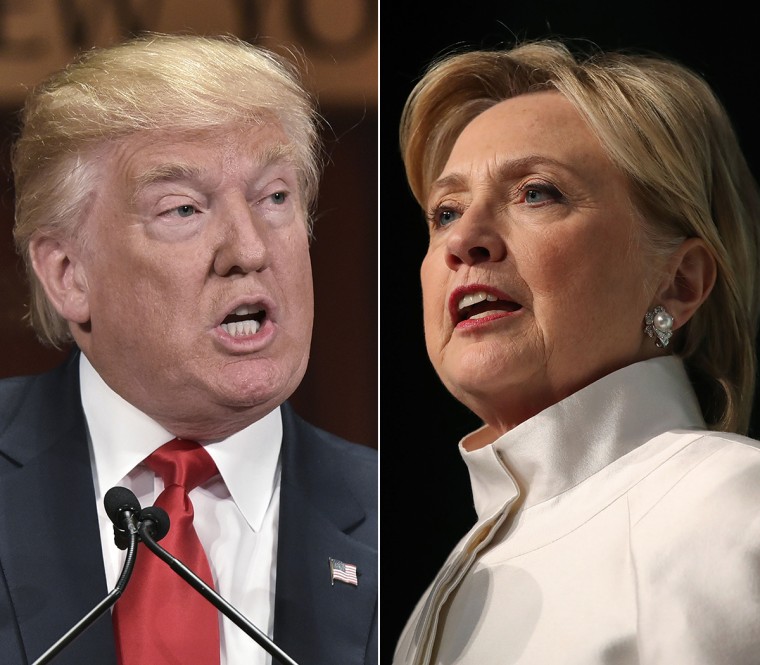Next week, Republican Donald Trump and Democrat Hillary Clinton will face off for the first time in the first of three scheduled presidential debates.
Historically one of the most watched political programs in presidential elections, televised debates offer Americans a chance to see the candidates on the same stage, answering the same questions and sparring on the answers. Vice presidential candidates have their own debate next month, giving Americans a shot to see the candidates who would be one-heartbeat from the Oval Office face off as well.
FOLLOW THE LATEST ON THE DEBATES HERE
Ahead of the debates, here’s what you need to know.
Why do we have debates and who runs them?
Following a string of years where candidates refused to debate and studies revealing that debates were a crucial part of American elections, the Commission on Presidential Debates says it was established as a bipartisan and nonprofit organization, with the support and leadership of both major parties, to sponsor and orchestrate debates. CPD’s board of directors is staffed by both Republicans and Democrats, as well as other prominent individuals. Criteria for inclusion, dates and locations are decided upon well in advance of the debate to avoid implications of bias.
No federal law requires major candidates to participate, but all major candidates have participated in more than two decades.
Where and when are the debates?
September 26, 2016: Presidential Debate at Hofstra University (Hempstead, New York)
October 4, 2016: Vice-Presidential Debate at Longwood University (Farmville, Virginia)
October 9, 2016: Presidential Debate at Washington University in St. Louis (St. Louis, Missouri)
October 19, 2016: Presidential Debate at the University of Las Vegas, Nevada (Las Vegas, Nevada)
All are 90 minutes long, and run from 9 p.m. to 10:30 p.m.
Who gets on the debate stage?
You might have heard Libertarian candidate Gary Johnson complaining of his exclusion from the debates, but he had a shot at making the stage, too. All candidates who poll above 15% in an aggregate of five polls selected by the Commission are invited to attend. The Commission on Presidential Debates announced that the first two much-anticipated fall debates will include only the major party candidates for president and vice president. Johnson and the Green Party's Jill Stein were eligible, but failed to meet the 15 percent threshold.
Related: Scott Walker Is Helping Mike Pence With Debate Prep
OK, so how does it all go down?
The first debate has six sections focused on six topics that are announced at least one week before the debate — each segment is 15 minutes long and begins with a question. Each candidate gets two minutes to respond to the question, and then they can respond to each other. Whatever time is left the moderator can use to ask more questions or allow more debate.
Moderators can extend sections to make sure both candidates get equal speaking time, but there are no commercial breaks.
The vice presidential debate is similar, but there's nine sections, are each ten minutes long.
What about the town hall meeting?
In the second presidential debate, half of the questions come from uncommitted voters selected by Gallup Organization. The other half come from the moderator based on "topics of broad interest as reflected in social media and other sources," according to the Commission. The candidates get two minutes to answer questions, and an additional minute for the moderator to "facilitate further discussion" — think fact checking or pressing an evasive candidate to answer the question better.
How are questions selected?
Debate moderators and their networks select the questions. The Commission is not involved. Town meetings allow citizens to ask their own questions. In addition, for the first time in a presidential general election debate, Facebook will source questions from users, according to a plan released by the Commission on Presidential Debates.
Who are the debate moderators, and how were they selected?
First presidential debate, 9/26: Lester Holt, Anchor, NBC Nightly News
Vice presidential debate, 10/4: Elaine Quijano, Anchor, CBSN and Correspondent, CBS News
Second presidential debate (town meeting) 10/9: Martha Raddatz, Chief Global Affairs Correspondent and Co-Anchor of "This Week," ABC, and Anderson Cooper, Anchor, CNN
Third presidential debate: 10/19: Chris Wallace, Anchor, Fox News Sunday
The Commission says moderator selection is dependent on familiarity with candidates and issues, broadcast experience, and “an understanding that the debate should focus maximum time and attention on the candidates and their views.”
Where can I watch it?
Lots of places! On your television on networks including C-SPAN, ABC, CBS, FOX and NBC, CNN, Fox News and MSNBC, online with livestreams, and through Facebook Live and ABC News' partnership.

